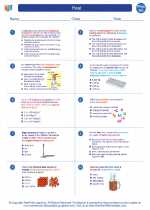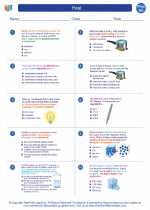Calculus
Calculus is a branch of mathematics that deals with the study of rates of change and accumulation. It is divided into two main branches: differential calculus and integral calculus.
Differential Calculus
Differential calculus is concerned with the study of how quantities change. It involves concepts such as derivatives and rates of change.
- Derivatives: The derivative of a function represents the rate at which the function's output changes with respect to its input. It is denoted by f'(x) or dy/dx.
- Rules of Differentiation: There are several rules for finding the derivatives of different types of functions, such as the power rule, product rule, quotient rule, and chain rule.
- Applications of Derivatives: Derivatives are used to solve problems in various fields, including physics, engineering, economics, and biology. They can be used to analyze motion, optimize functions, and solve related rates problems.
Integral Calculus
Integral calculus focuses on the accumulation of quantities and the computation of areas and volumes.
- Integrals: An integral represents the accumulation of a quantity over an interval. It is denoted by ∫.
- Definite and Indefinite Integrals: Definite integrals are used to compute the net accumulation of a quantity over a specific interval, while indefinite integrals represent a family of antiderivatives of a function.
- Integration Techniques: Various techniques, such as substitution, integration by parts, and trigonometric substitutions, are employed to evaluate integrals.
- Applications of Integrals: Integrals are used to calculate areas, volumes, work done, and other quantities in real-world problems.
Study Guide for Calculus
If you're studying calculus, here are some tips to help you succeed:
- Understand the basic concepts of limits, continuity, and differentiability, as they form the foundation of calculus.
- Practice finding derivatives using the various differentiation rules and understand the geometric interpretation of derivatives.
- Master the techniques of integration and be familiar with the relationship between differentiation and integration.
- Work on solving problems that involve applications of derivatives and integrals in different fields.
- Review and practice regularly to reinforce your understanding of calculus concepts.
By mastering calculus, you will gain a powerful tool for analyzing and solving a wide range of problems in science, engineering, economics, and other fields.
[Calculus] Related Worksheets and Study Guides:
.◂Physics Worksheets and Study Guides High School. Heat
The resources above cover the following skills:
PHYSICAL SCIENCE (NGSS)
Energy
Students who demonstrate understanding can:
Create a computational model to calculate the change in the energy of one component in a system when the change in energy of the other component(s) and energy flows in and out of the system are known.
Develop and use models to illustrate that energy at the macroscopic scale can be accounted for as either motions of particles or energy stored in fields.



